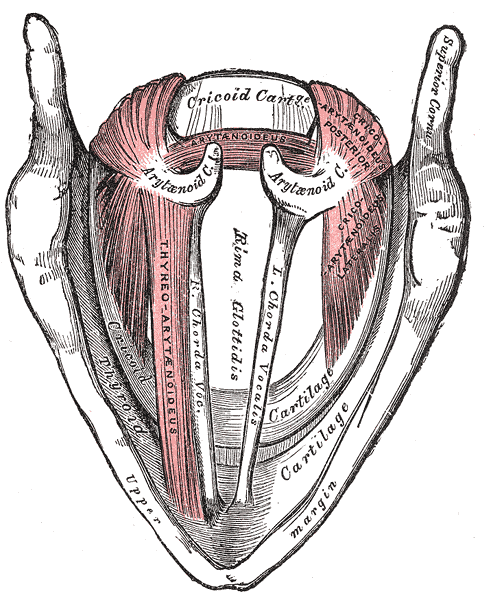Why is (basic) understanding of the anatomy and physiology of the voice important for singers?
Knowing the names of the muscles and cartilages that we use while singing is not going to make you a better singer. It is quite possible to sing even without knowing the name of a single muscle! But some basic understanding of how the voice works can be useful for a variety of reasons. Here are six of them.

1.If you know how the voice works, you can work with it instead of against it.
This will speed up your learning process. The voice responds directly to what you do. If an exercise is done the right way, you will notice the effect of it immediately and you can be sure you are on the right track.
2. It makes it easier for you to understand singing technique.
This will help you become faster at recognizing and solving vocal issues and problems, like reaching high or low notes, solving unintentional vocal breaks, wobbly notes, not enough air, vocal strain, and so on.
Some singers and teachers are afraid of ‘thinking too much’ about what is happening in the body during singing. Sometimes singers looking for solutions to their vocal issues are given advise like “just let the voice do what it naturally wants to do”.
But just like we cannot learn to play the piano, flute, or any other musical instrument by “letting the instrument do what it naturally wants to do”, we cannot learn to sing just by “letting the voice do what it naturally wants to do”. And we definitely cannot solve vocal issues without looking into the functions of the instrument, our voice.
3. It will help you understand what singing in tune is and what to do about pitch problems.
When talking about singing skills, many people focus firstly on singing in tune. Unfortunately, still today a lot of singers with pitch problems are told that there is something wrong with their ears. Others are being told they are tone-deaf and should better just shut up.
Singing in tune is a coordination between hearing the pitch and being able to reproduce it. Being able to produce the right pitch has often more to do with singing technique than it has to do with our ears. If you know how the voice works, you can actually do something about not singing in tune.
4. It ensures us that what we do is healthy.
Singing should always feel comfortable. If it itches, scratches or hurts, this is a sign you are doing something wrong.
All sounds can be produced in a healthy way. Even sounds that sound loud, sharp, metallic, rough or ‘unhealthy’. But only teachers with extensive knowledge of the voice can teach you how to produce these sounds in a healthy manner.
5. It helps you separate fact from fiction.
Singers are bombarded with (well-meant) vague advice like “sing from your diaphragm”, “sing in the mask”, and so on. It does not mean all the advice is bad. Sometimes pictures and mental images can be wonderful tools for learning. However, some of the advice given to singers is plain fiction, and there exist a lot of myths and misconceptions about the voice.
Understanding how the voice works and how different sounds are produced in the body helps you distinguish between good, well-intended but vaguely presented, and plain bad advice.
6. It protects you from people in the industry who do not have (sufficient) knowledge of the voice.
Just because somebody is a teacher, coach, producer, or has worked with famous people, it does not automatically make them experts on the voice. These people might be good teachers and have some good advise and tools to share with you, but it does not mean they have sufficient knowledge or are updated in the developments in voice research and vocal pedagogy.
Research is constantly developing and we keep learning new things about how the voice works. Be aware that even some coaches and teachers can be “lazy” and look for the easy way out, or for quick solutions to success. And some teachers, again, think that they already know everything they should know, and are unwilling to learn about new developments or keep developing themselves. Nobody can of course know it all, and not all singing teachers need to be experts on solving all technique problems – there are plenty of other things to work on in singing besides technique! Teachers can, however, make sure they keep developing themselves, try to stay updated, and are honest about what they do know (or don’t).
Make sure you check the backgrounds of your teachers to find how they have trained and what kind of teaching experience they have, and whether they seek further (ongoing) training. Also be aware that lot of products are sold based on pseudo science or wrong information about the voice. Always make sure there has been research done to back up whatever method you might be interested in learning more about. And remember that famous people being associated with a method does not equal research.

